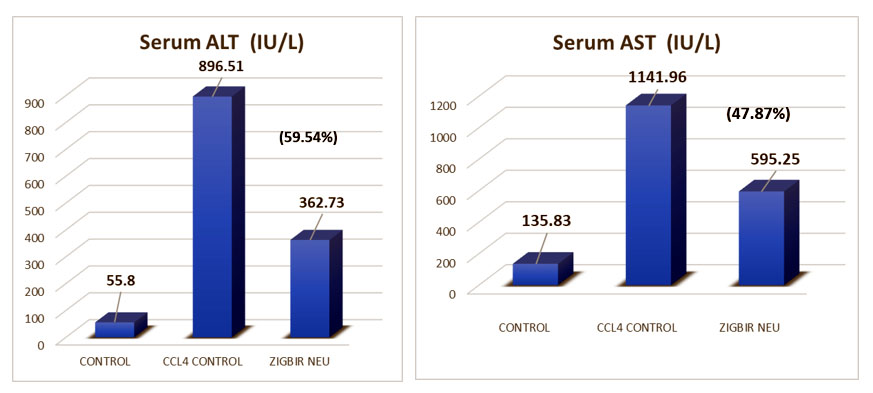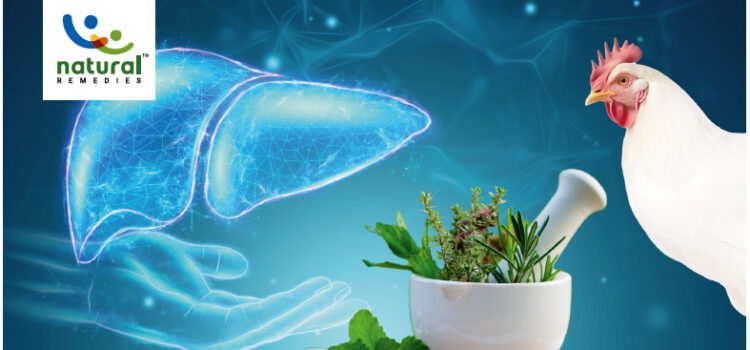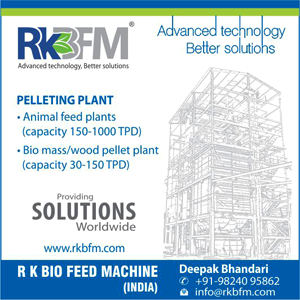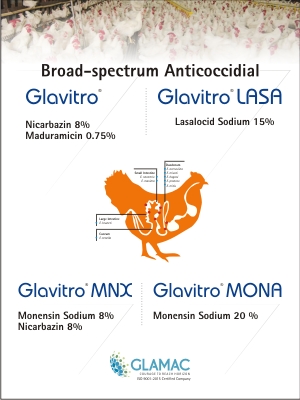Role of liver in detoxification. How Phytogenics helps during toxicity of liver?
The poultry industry plays a crucial role in meeting the global demand for animal protein. However, the quality of the feed that poultry consumes has a significant impact on both their health and production. The liver is a significant organ that is vulnerable to harm from improperly formulated or contaminated feed, which can result in a variety of health problems.

The liver health of poultry birds is seriously threatened by the toxification of poultry feed, which happens when dangerous compounds enter the feed supply chain. Toxification in poultry feed refers to the introduction of harmful substances such as mycotoxins, heavy metals, pesticides, and other contaminants into the feed. During cultivation, storage, shipping, and processing, among other steps of the feed production and distribution process, these chemicals might appear. Once these toxins find their way into the feed, they can have profound effects on the health of poultry, particularly on the liver.
Toxins and their impact
- Mycotoxicosis: Mycotoxins, produced by Molds that grow on feed ingredients, are a common form of feed contamination. Mycotoxins that can harm the liver include aflatoxins, ochratoxins, triclothenes type A, and fumonisins. They create inflammation, change liver enzymes, hinder detoxification, and jeopardise the liver’s capacity to operate normally.
- Pesticide Residues: Residues of pesticides used on crops or feed ingredients can find their way into poultry feed. Chronic exposure to these chemicals can strain the liver’s detoxification capacity and negatively impact liver health.
- Heavy Metal Poisoning: Some feed ingredients may contain heavy metals like lead, mercury, and cadmium. These metals accumulate in the liver, causing oxidative stress and interfering with metabolic processes. The liver’s role in detoxifying these metals can lead to cellular damage and inflammation.
The Liver’s Role in Poultry Health
The liver serves several purposes in the physiology of chickens, including metabolism, detoxification, and the control of many physiological processes. It is essential for metabolizing and eliminating toxins that enter the body of the chicken. However, regular exposure to contaminated feed may hamper the liver’s ability to detoxify, which can result in several health problems. The liver is the major detoxification organ in the body. A wide range of fat-soluble substances, such as metabolic end products (such as ammonia, byproducts of blood cell lysis, and bile pigments), contaminants (e.g., pesticides), anti-nutrients, heavy metals, additives (e.g., antibiotics), and drugs, are among the potential toxins. These can harm the bird’s health to varied degrees depending on its concentration. During the process of detoxification, through oxidation, reduction, hydrolysis, and conjugation, the liver converts these toxins to more polar and water-soluble waste products, which are then eliminated via the kidneys and gall bladder. Importantly, the phagocytic action of Kupffer cells is a principal mechanism by which the microorganisms entering the blood are destroyed.
Can phytogenic enhance liver detoxification function?
Considering the rising demand for chicken that has been grown organically, employing naturally occurring nutrients may be a cost-effective method to boost farm output and wellbeing. The liver has been shown to benefit from a variety of herbs, which may increase farm productivity. Phytogenic feed additives are made up of elements that come from plants, including alkaloids, flavonoids, saponins, phenolic compounds, and essential oils. Numerous studies have documented the numerous functions of Phytogenic Feed Additives (PFAs), including advantages in feed palatability, intestinal growth, and health as well as antimicrobial, antioxidant, anthelminthic, anti-inflammatory, anti-stress, and nutrigenomic effects.
With all these properties of phytogenic, Natural Remedies has come up with a new formulation of phytogenic that enhances poultry liver functioning. Zigbir NEU, an NRSBP, is selectively crafted with the finest phytoconstituents to meet the needs of high-performing modern birds. Zigbir NEU with NEU function provides natural protection of the liver against known and unknown toxins in poultry, enhances liver health and metabolism, and provides uniform growth and productivity.
In an experiment conducted on Wistar rats, they were treated with CCl4 (Carbon Tetra Chloride), which directly affects the liver. It was observed that rats supplemented with Zigbir NEU have significantly less damage to the liver as compared to rats not supplemented with Zigbir NEU. The hepatic enzymes (ALT and AST) were significantly increased in the non-supplemented group as compared to the Zigbir NEU and control groups.
In conclusion, high-performing modern breeds are always at risk of contact with toxins, whether known or unknown, and the liver is under continuous pressure to meet the requirements of modern birds, whether metabolism, secretion, storage, detoxification, or other, to have high productivity and growth.
Zigbir NEU is a polyherbal formulation that facilitates enhanced liver functions and optimum metabolism, along with hepatoprotective activity.

Authors: Midhun Raj and Dr. Jagritee Singh
Reference:
https://mycotoxinsite.com/effects-of-mycotoxins-in-poultry/
Ipçak, H.H., 2023. The Role of Phytogenic Feed Additives in Modulating Poultry Nutritional Physiology and Genomics.
Zaefarian, F., Abdollahi, M.R., Cowieson, A. and Ravindran, V., 2019. Avian liver: the forgotten organ. Animals, 9(2), p.63






